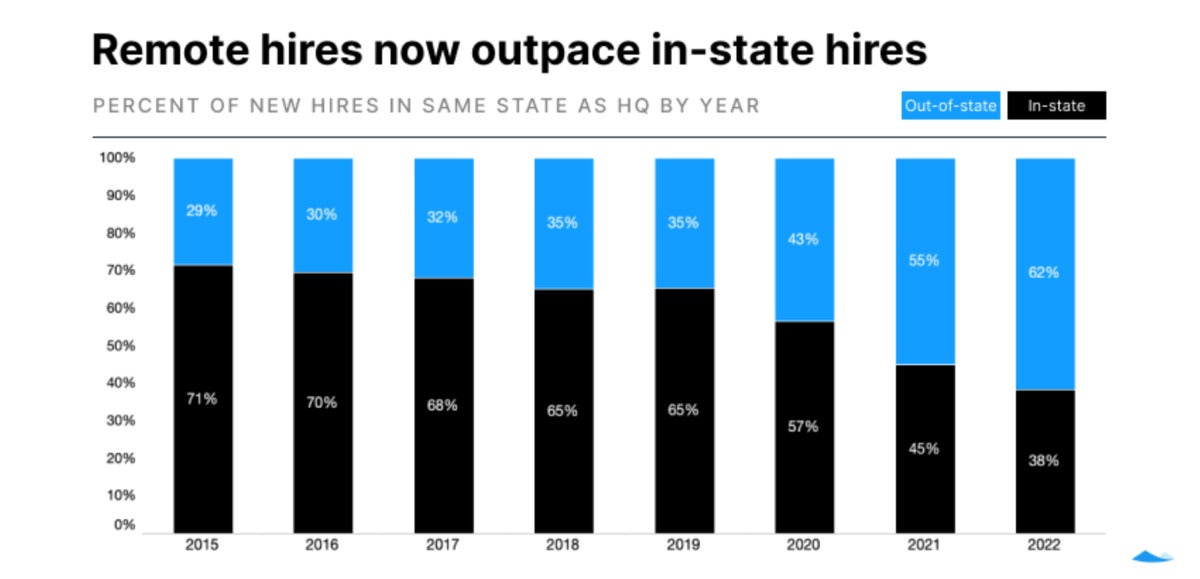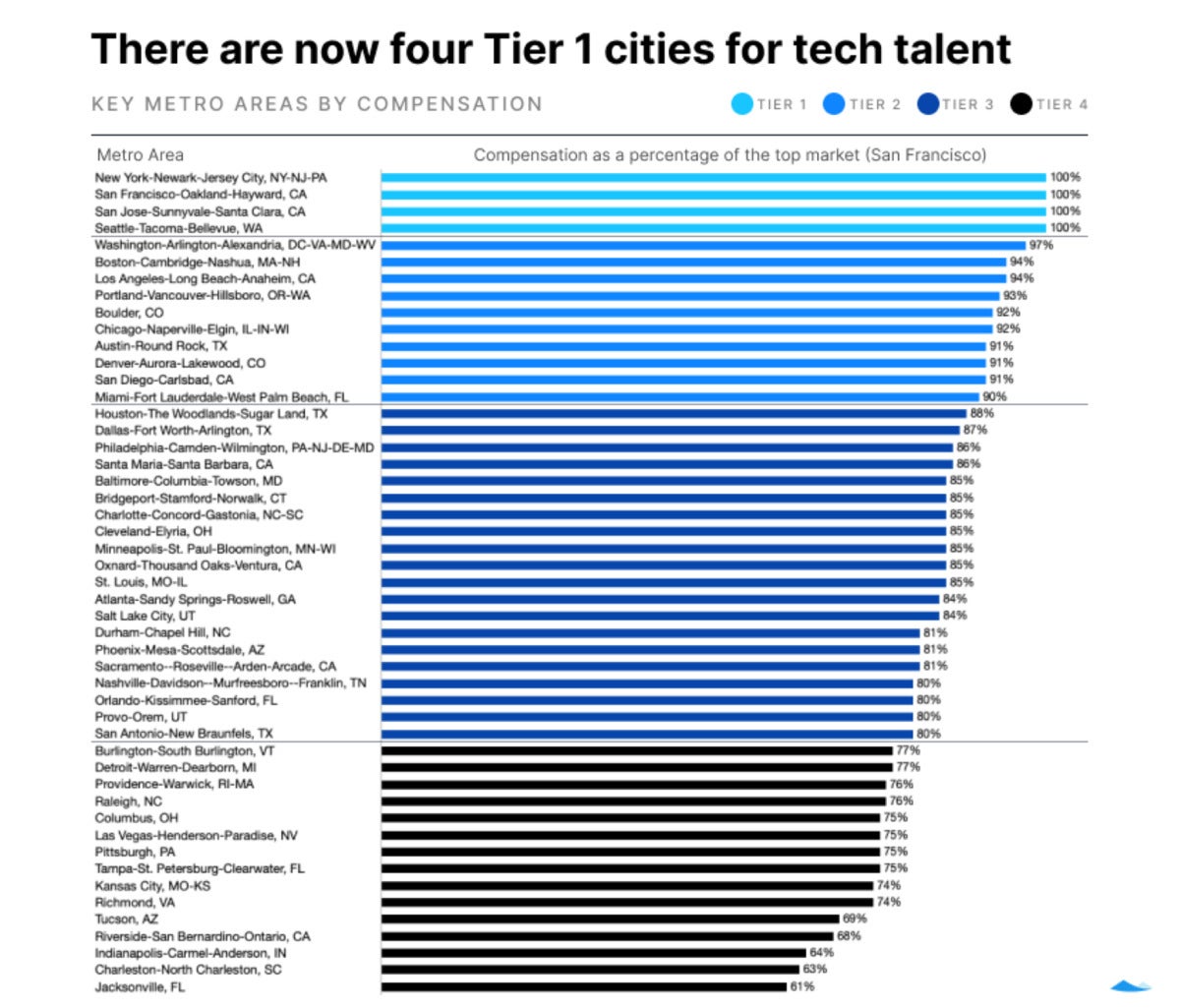































As more employees work remotely in the aftermath the global COVID-19 pandemic, salaries based on where in US they live are showing signs of leveling.
For example, a recent study by fintech startup Carta found that salaries for tech startup employees in Seattle now match those of workers in San Francisco, which is a tech market salary leader.
"As remote work becomes a fact of life, [startup] founders are increasingly faced with a key decision: should they adjust compensation by location?" the Carta report said. "The vast majority of companies (84%) do take location into account when deciding on compensation packages."
In 2019, about 35% of new hires were based in a different state than the primary company headquarters. So far in 2022, that number has jumped to 62%, according to Carta.
Startups with more modest market valuations are more likely to adjust compensation by location. Around a quarter of companies valued at more than$500 million choose to pay employees equally, no matter their current location, according to Carta, which makes company equity management software for startups.
"Within Carta's dataset of venture-backed startups, we are seeing median compensation in many U.S. cities moving towards San Francisco compensation rates," said Peter Walker, director of Insights for Carta and author of the report.
 Carta
Carta Because Carta's research focused on startups, it's less surprising the company found compensation more likely to level out nationally, according to Amy Stewart, senior content marketing manager at Payscale, a provider of cloud compensation management software.
"Technology startups are smaller and more agile, and there's a lot more incentive for them to reduce costs and find ways to attract top talent," Stewart said. "Tech talent in particular is attracted to the ability to work flexibly and to work from home."
As employees have grown used to either remote work or hybrid setups where some employees are in the office at least part of the workweek, they've come to expect workplace flexibility.
In its 2021 State of Remote Work Report, Payscale found on average that 43% of employees expect more organizations to offer remote work after the pandemic ends. "And that number goes as high as 75% for marketing and advertising professionals and 71% for technology workers," Stewart said.
Payscale's research also found that fully remote workers earn more than non-remote workers, even when controlling for job characteristics. And it found that remote workers reported higher rates of job satisfaction and retention than non-remote workers.
"...That has been met with varying amounts of accommodation from employers," Stewart said. "Overall, we're actually seeing fewer companies than I initially thought that are thinking that remote work would change the competitive landscape."
Earlier this year, another Payscale survey found that 73% of organizations were concerned remote work would disrupt the competitive landscape for talent. But those concerns have apparently cooled: a second survey in Q4 2021 found only 47% of organizations were worried about disruptions.
Payscale saw similar changes in how companies view remote work compared to hybrid work. In mid 2021, more companies were worried about remote work becoming the norm. Since then, as companies have worked out the kinks involving scheduling employee time in the office, those fears have abated, according to Stewart.
 Carta
Carta As for whether wages are leveling nationwide, as Carta seemed to find, Stewart said she is not seeing tech workers make the same everywhere yet, and it would take time for market forces to drive this result.
Carta's study acknowledges that the number of companies offering the same pay, regardless of location, for certain job functions (primarily engineering) is still small. But companies that do geographically level compensation often do so "as a perk to retain employees, who can choose to work remotely from lower-cost locations, or as a strategy to attract new workers," Carta said.
Tony Guadagni, a senior principal in research firm Gartner's human resources practice, noted that remote work trends have increased the number of organizations that recruit talent based on skills rather than their proximity to an office location.
As part of that trend, Guadagni said a national leveling of salaries is ocurring, but it's happening slowly. The idea that wages in Seattle have caught up to San Francisco's compensation levels - as Carta's data showed - surprised Guadagni. But he said it's understandable, given Seattle's already large tech labor pool.
"That's a lot more understandable than somewhere like...Albany catching up with San Francisco," he said.
 Carta
Carta "I do think, ultimately, we expect the IT market will become more national, and that's going to level out compensation between geographical areas that traditionally had a higher cost of labor and lower cost of labor," Guadagni continued. "There will be a leveling of compensation, at least more than it is now. I don't expect it will become completely national or one market rate for all jobs regardless of geography."
One issue slowing the adoption of a nationalized compensation norm is the need to reduce tech employee salaries in traditionally high-cost areas while raising them in lower-cost areas, Guadagni said.
"Reducing wages leaves a really bad taste in the mouth of employees. So, rather than cut pay, they'll usually slow down the rate of salary increases," Guadagni said. "I think some people expected that to happen overnight, but it's just something that's going to happen over time."
Another factor stemming the tide? The IT labor market is the most in-demand, competitive labor market of the last several decades.
"People may have had grand ideas of trying to hire more nationally, but they're finding themselves hiring where they're able to hire. And they've shown willingness to pay a premium for critical talent, and a lot of times that means from traditional areas where the largest talent pools already are. It's just easier to recruit from there," Guadagni said.
More rural and less traditional market regions also lack things like employee referrals, which is a huge source of hiring for companies that have a reputation for paying high wages, Guadagni noted.
"And getting that total compensation offer right, trying to get that right in a new market, that can be a challenging process," Guadagni said. "You're not necessarily going to get it right the first time around.
"The main thing to reiterate is we expect job markets to become more national," he added. "It's going to take time."
 Tags chauds:
Industrie de la technologie
Travail à distance
carrières
Les salaires
Tags chauds:
Industrie de la technologie
Travail à distance
carrières
Les salaires